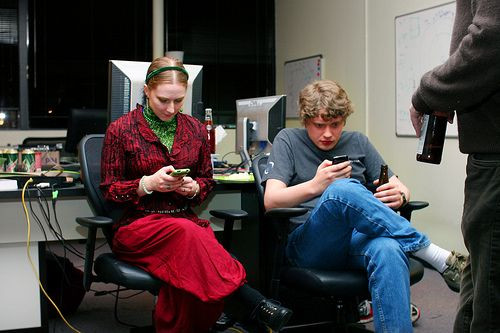Office Holiday Parties Don’t Work: How Diverse Team-Building Actually Turns Into Racial Divide

When idle water cooler chit-chat turns into organized group interaction, topics of conversation run the risk of alienating certain coworkers, according to a new study from Columbia University Business School. Office parties, in particular, which are set up with the best of intentions to drum up camaraderie or holiday spirit, were found to polarize employees more than they were to unite them.
Published in the journal Organization Science, the study suggests a new way for managers to consider how they cultivate feelings of togetherness among their staff. Telling a pool of coworkers to “play nice” with one another is too simple, the authors argue. Truly effective measures demand less emphasis on the event and greater importance on the people comprising it.
"The results are quite ironic," Columbia professor Katherine Phillips said in a statement. "Managers think these well-intentioned attempts at promoting diversity and inclusion in the workplace have a positive effect on employees, yet the feedback we received from our study says these exercises are not helping to bridge interracial gaps. This could be a huge roadblock for companies wanting to leverage their full potential in the competitive global marketplace."
The basic rub is this: Companies view office holiday parties as a way to get people away from their desks and socialize with one another. Anonymous heads turn into people, and these people have ideas that may resonate with other employees, thus forming the early stages of a bond. The problem, as the researchers see it, is that these relationships often come at the expense of other coworkers’ feelings of inclusion. One faction discusses their favorite artistic movements, while another, far removed, discusses their favorite beers — thus the dichotomies abound.
The team arrived at this conclusion after conducting two specific studies. The first recruited 228 MBA students who recalled their most recent employment opportunities, while the second culled nationally representative data from 141 people currently in the U.S. workforce. Both groups were asked about their experiences with company-sponsored events, and information was obtained about each group’s demographic characteristics, family background, and work tenure.
Each study showed the same outcome. When people attended the events, they felt genuinely closer with their coworkers — but only with those of similar racial background. This posed a curious question to the researchers: Why would employees attend company functions if not to socialize?
The answer, it turns out, traces back to the all-too-common denominator of politics. Feelings of good standing within a company don’t just stem from personal inter-office relationships; company events are viewed as a way to foster professional inter-office relationships, too. Researchers found that workers were compelled to seem social to their bosses, to talk about things they didn’t have an interest in just to appease a higher-up.
"The takeaway here is not that companies should cancel their office holiday party this month,” Phillips said. “It is to make sure managers who want to foster closer coworker relationships know that they need to focus less on the party planning and more on creating a culture that accepts, respects, and assimilates differences between colleagues.”
This doesn’t mean managers must speak with everyone, or even like everyone. But they are responsible for ensuring their staff can socialize without feeling left out. Admittedly, that is already part of many managers’ job descriptions. Uplifting an employee who excels in one area but remains deficient in another happens all the time in offices around the country. According to Phillips and her colleagues, social situations are no different: where there is a tear, managers mend.
"Managers should pay special attention to the quality of the employee experience during these office gatherings,” Phillips concluded. “Working to understand their employee through this process is the first step to a happier employee, which in turn creates a better company."
Source: Dumas T, Phillips K, Rothbard N. Getting Closer at the Company Party: Integration Experiences, Racial Dissimilarity, and Workplace Relationships. Organization Science. 2013.



























